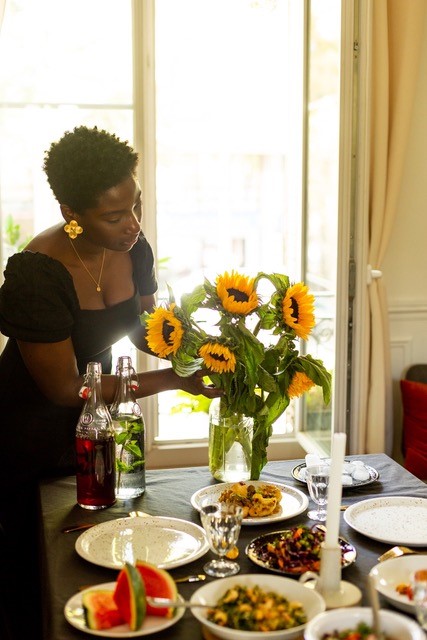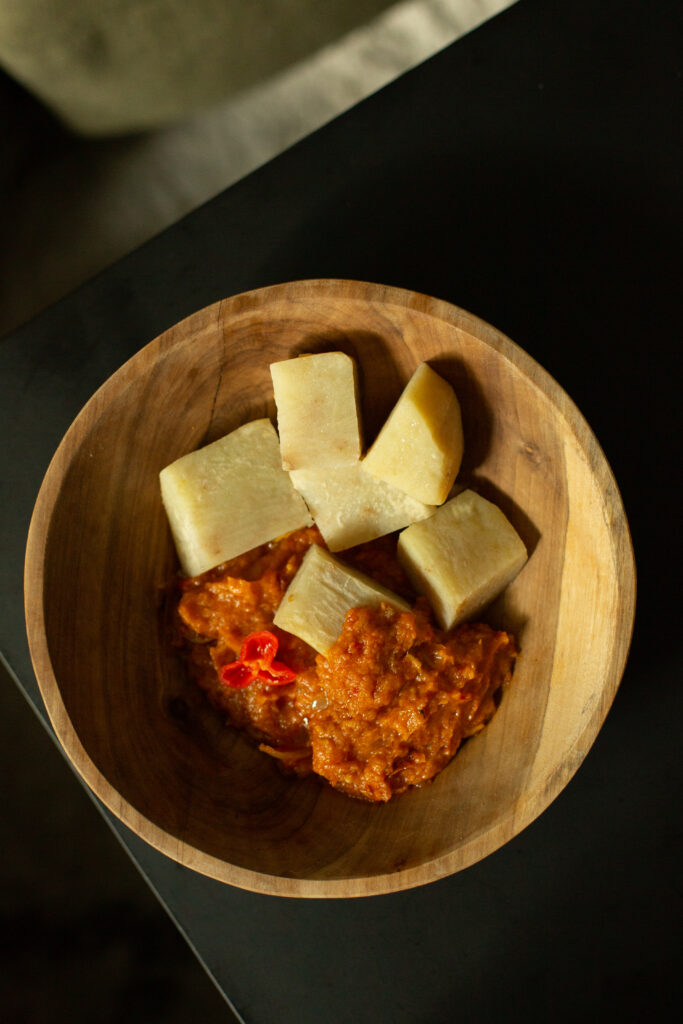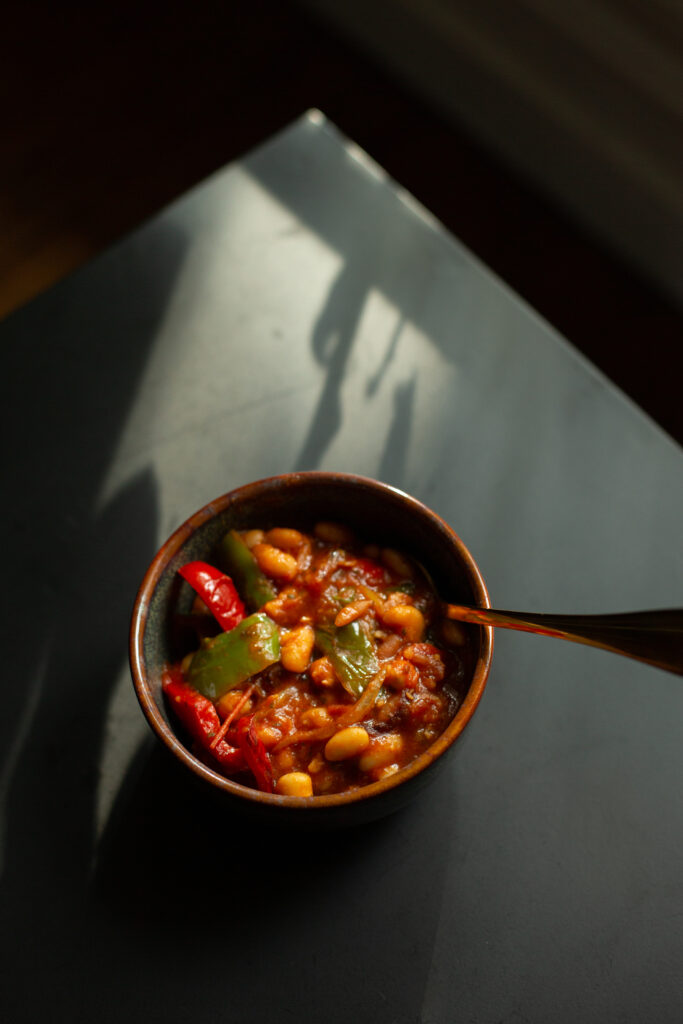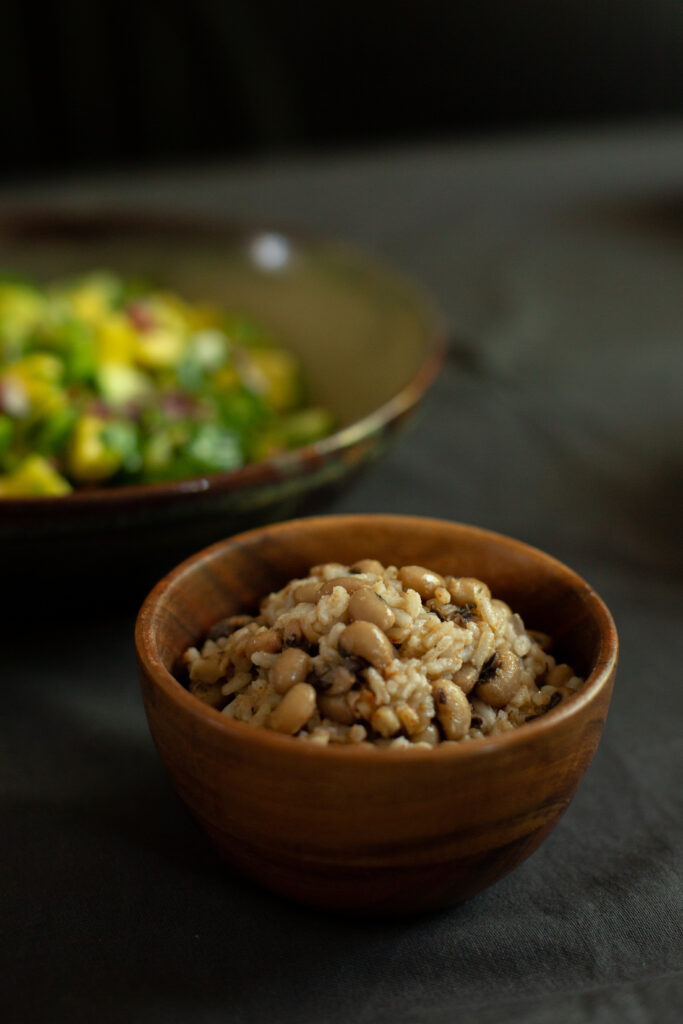Cooking is an art, a way of life but also an identity factor. From an early age in the kitchen, Marie Kacouchia grew up between France and the Ivory Coast. This Parisian chef has long explored the world’s gastronomy before returning to her African roots. Today she has decided to reclaim her cultural heritage through food and to promote Afro-veganism. In her latest cookbook African cuisines, she offers an introduction to this cuisine that wants to be accessible, gastronomic but also political. Meeting with an inspiring and committed chef.
Marie Kacouchia is 30 years old and already has two books to her name. This amateur chef has always had a passion for cooking, but in recent years she has embarked on a “new way of life”: Afro-veganism. Combining veganism and flavors of Africa, this movement has the mission of making vegetable cooking accessible and fighting racism. After a first self-published book, Marie Kacouchia invites us to discover this gastronomy in African cuisines, published by La Plage. Mafé with vegetables, yassa burger, pancakes with plantains or bissap with basil… With 80 recipes, this book offers a mixed, political and authentic cuisine. A true introduction to Afro-veganism, including anecdotes and practical advice to facilitate immersion. Meet the author of this essential book.

Your book starts with an assignment to your parents and a sentence from your mother, Marie-Madeleine: “We cook with the heart or we don’t cook”. Is cooking a family affair for you?
There is, undeniably. I come from a family where we were very humble, where we didn’t say ‘I love you’ easily and cooking was a way for us to express our feelings. We’ve all taken this fold and we like to cook between us. In my case I have always loved to cook and very quickly in this activity I saw a way to explore my personality and my creativity.
As for African cuisine, you would be inclined to think that it was my mother who passed this knowledge on to me, because she was African. It’s partly true, she cooks really well and I’ve been through a lot of preparation. But at home we don’t eat Ivorian or Burkinabe dishes every day. Let’s just say it was reserved for somewhat special occasions, when my mother was homesick. So I first explored French cuisine, Asian cuisine and many other cuisines before returning to African cuisine quite late.

When did you develop your interest in African cuisine?
This interest eventually came at the same time as an in-depth questioning about my identity towards the end of my studies. I wondered a lot about my taste, my personality and the fact that I had put everything that had to do with my roots in the background. At the time, it was the revival of the diaper movement that promotes frizzy hair and the rapid arrival of wax in France. I decided to return to the Ivory Coast and there it was a real rediscovery. First a rediscovery of food, because there were many that I did not consume daily in France, but also a rediscovery of traditions, about how to eat, how to consume meals. Through this kitchen I found a way to communicate with members of my family whose language I don’t speak.
As a self-taught artist, I experiment daily and continue to train myself in afro kitchens, watching and imitating aunts, mothers and people I follow on social networks. It’s a very empirical process, but it then allows me to find my style and makes me want to share my knowledge, especially through books.
This recipe book, as the title implies, approaches the cuisines of Africa through the prism of veganism. Why did you make this choice?
In fact, I thought so from the start. Firstly, because I’ve been vegan, or rather Afro-vegan myself, for a year. I also made my switch while writing the book, as I used to consider myself quite vegetarian. It is mainly thanks to meeting vegans and afro-vegans and seeing my brother also vegan that I told myself it was time for me to take this step. But I’m still learning and every day I keep discovering what it means to be vegan and black, that is, to have a conception of veganism that is not Eurocentric. I want to share this journey and the book is one of the tools I have chosen to do that.
This book is also a great opportunity to break the harsh clichés about African cuisine. There are still stigmas that come from non-African people, as well as from Africans, who say, for example, that certain dishes are reserved for certain times, that African cuisines are not accessible, that they are too greasy and rich in meat. So many a priori have crystallized around this gastronomy that we deprive ourselves of a multitude of dishes that are nevertheless very good. These cuisines deserve fame because they can also be beneficial and correspond to a quite holistic approach to food, with a strong link to body care, especially through the use of herbs, infusions, etc.
By crossing African cuisines and veganism, the aim is to kill two birds with one stone. I try to show that African cuisines are accessible and at the same time veganism allows you to rethink your approach to food and question the relationship with living things.

You talked about clichés and a priori there are also some around veganism. Is your book aimed at an already convinced audience?
No, I think it applies to everyone, but it’s true that veganism still suffers from a lot of clichés. People who are not vegan will think that this is a cuisine of hardship and that this way of life can be seen as the whim of a spoiled child. Some people sometimes have very strong reactions, almost epidermic, when they see the word “vegan”. I think it’s because it challenges everything they already know, it’s like breaking their software. But Afro-veganism is not a cuisine of deprivation, it is a cuisine of life.
When we return to veganism, there is something very profound: we no longer eat like a robot, we rediscover food and we ask ourselves questions about what we are ingesting several times a day. To write my book, I asked African people if they knew any vegan recipes. Either they laughed or they didn’t even know what I was talking about. But thanks to discussions and explanations, the examples poured in. My mother also remembered that in our village, fish and meat were reserved for holidays. Today she doesn’t eat meat anymore and I find it very inspiring and courageous to start this transition at her age.
My mother also reminded me of the medicinal use of certain preparations or ingredients such as bissap or kinkeliba. In Africa, as elsewhere, there is a wealth of empirical knowledge that deserves to be recognized and celebrated, in the same way that Ayurvedic medicine from India, for example, is celebrated today. We don’t have to wait for foods to be labeled “superfoods” to give them our attention.
Besides the culinary aspect, would you say that Afro-veganism is a political approach?
Yes absolutely. In fact, I think it’s political in the rawest sense of the word, ie ‘tackling society differently’. This movement invites us to rethink the contents of our plates, to reflect on the fact that our food has been constructed and colonized, to question the motivations behind our food choices, to understand that sometimes these choices can affect businesses or ways of thinking. support those who are racist, misogynist etc. Afro-veganism invites us to change the prism and get out of a capitalist vision in which the West is central.
In general, I think it’s important to question our choices, our habits and what they mean, and whether we’re black or not, Afro-descendant or not. If you don’t agree with the observation you’ve made, there are concrete ways to act and change. If we want it, we can do it.

Exactly, what advice would you give to people who are curious about veganism and afro-veganism, but might not dare to get started?
I would tell them first that this is not a competition. You don’t have to be “perfect” to learn about veganism or afro-veganism. You just have to get out there, get to work and try to be kind to yourself. If you’ve been eating a certain way for 27 years, it’s quite difficult to suddenly lose your way, have to adopt and integrate socially. But along the way we gain confidence, we learn to cook vegan and above all to cook things that make us happy, without having to use products from animal exploitation.
Social networks have many flaws, but they are also an important resource in starting this transition. They allow us to bond with people like us, who share our doubts and fears or, on the contrary, guide us through their experience. I myself try to share what I can on the networks in order to inspire other people in turn. As my mother always told me, “You don’t attract flies with vinegar”. So I try to create positive content that inspires.
On my networks, as with the book, my mission is the same: to make Afro-vegan cuisine accessible. I would like the people who read the book to become familiar with this gastronomy and to be able to integrate certain recipes into their repertoire, which is why I have also chosen easy recipes. To cook Afro, he will make some specific ingredients for you, but don’t panic! They can be found online, on some supermarket shelves or in specialty stores. When in Paris, take a stroll to the Goutte d’Or, Château d’eau, Château rouge or even Barbès and you’ll find everything you need to spoil yourself.
To discover Marie Kacouchia’s recipes, advice and thoughts, you can find her on her Instagram account. The book Cuisine d’Afrique is for sale here.